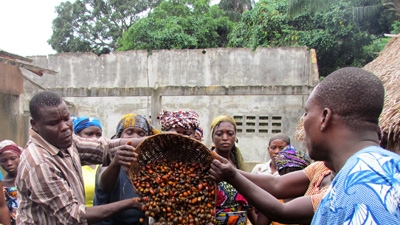BAMEZOUN, May 6, 2013 - In Bamezoun, a sacred forest located in the commune of Aguégués, a region irrigated by the Ouémé river in the south-east of the country, the villagers did not realize that wood cutting, poaching, and overfishing, activities they had hitherto depended on to meet their needs, had been exerting considerable pressure on natural resources. They have now been persuaded to abandon these practices, as a result of a Community-Based Coastal and Marine Biodiversity Management Project (CBCBM), designed to create protected zones.
“We now realize that it is important to preserve the forest in our village, and no one is going to cut any more wood,” says Jacqueline Dandjinou, President of the 17-member Hozinune women’s group, an association of palm oil producers that has benefited from income generating activities (IGAs). The situation has improved in the village largely because its inhabitants have benefited from this project, which started on October 11, 2008, with funding from a Global Environment Facility (GEF) grant of US$4.3 million.
“The project has helped to bring the riparian populations out of abject poverty, which had caused them to destroy the natural resources. Now we know that protecting our mangroves is essential for the survival of future generations. Fish farming allows us to meet our families’ needs and educate our children,” says Mr. Djikpesse Martin, President of the Yémalin association of Togbin-Adouko, in the commune of Calavi in the south-west of the country, another town covered by this project.
To enable beneficiaries to better manage these newly-protected zones, training sessions were organized for 475 community actors in the following areas: marine and coastal resource conservation and management, tools and techniques for community-based natural resource management, community-based procurement, financial management of associations, planning, and monitoring of activities.
Infrastructure for market gardening (water pumps, sprayers, development of irrigated areas, seeds, organic fertilizers), fish farming (fish ponds, fish cages, fish pens, above-ground fish tanks), and transport (motorized boats, tricycles, motorcycles) was also provided to enable beneficiaries to engage in income generating activities such as the production and sale of market products, fish farming, salt trade, fish processing and marketing, and palm oil production.
“We currently produce 225 liters of palm oil and 10 baskets of palm nuts per week. The machines received are helping us increase our production and expand our business. The profit earned is deposited in a savings account at the Local Agricultural Credit Union [Caisse Locale de Crédit Agricole Mutuel CLCAM],” says Jacqueline Dandjinou.
Awareness-raising campaigns organized under this project (a total of 116 compared to the 38 originally planned) have enabled residents of the sites involved to realize the importance of conserving their natural resources. The CBCBM is expected to finance a total of 149 community groups, involving 1,669 direct beneficiaries, of which 785 are women (49 percent), for a total of CFAF 505 million (approximately US$1 million).
“The implementation of these income generating activities in Bamezoun has included the four villages located around the community biodiversity conservation area (Honzin, Hondji, Bembe 1, and Bembe 2) and has helped reduce poverty in this population,” explains Biaou Oraly, Project Manager.
According to him, the project has not only reduced the pressures on the natural resources, but has also increased the revenues of beneficiaries, hence the importance of making the necessary investments so that other Beninese communities may also benefit from it.

